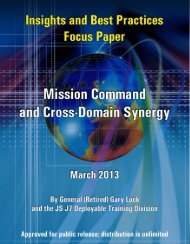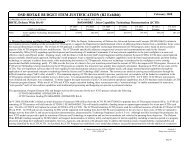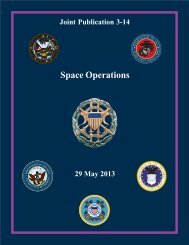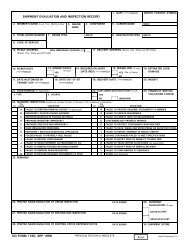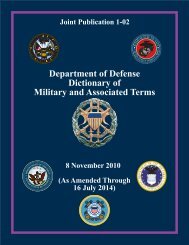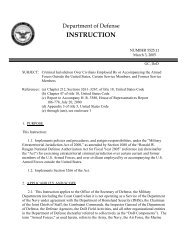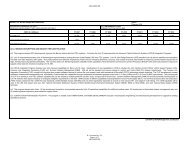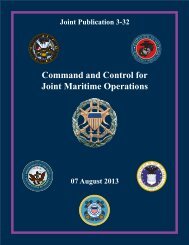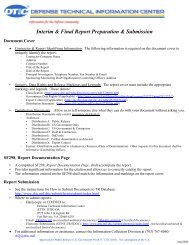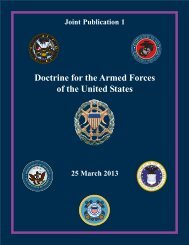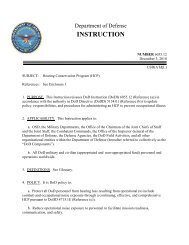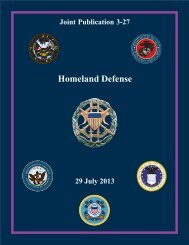JP 3-16, Multinational Operations - Defense Technical Information ...
JP 3-16, Multinational Operations - Defense Technical Information ...
JP 3-16, Multinational Operations - Defense Technical Information ...
You also want an ePaper? Increase the reach of your titles
YUMPU automatically turns print PDFs into web optimized ePapers that Google loves.
Chapter III<br />
the situation and severe time constraints, a NEO will not be executed by a multinational<br />
command; rather, a parallel command structure of individual JTFs executing under national<br />
command is used. Under such situations, an MNCC, established by one of the JTFs in<br />
support of all JTFs, is an option for multinational coordination of operations. Under an<br />
emergency situation involving the safety of human life or the protection of property, offers<br />
of voluntary service from other countries may be accepted prior to Presidential approval.<br />
f. <strong>Multinational</strong> evacuations involve multiple nation diplomatic initiatives—with MNFs<br />
conducting a NEO in a supporting role. A political decision from each of the participating<br />
nations is required to conduct a NEO with an MNF. Should the political powers decide on a<br />
requirement for a multinational NEO, an initiating directive should be issued to enable<br />
detailed operational planning to commence.<br />
For additional guidance on NEOs, refer to <strong>JP</strong> 3-68, Noncombatant Evacuation <strong>Operations</strong>.<br />
Specific guidance on conducting NEOs within NATO is provided in A<strong>JP</strong>-3.4.2, Allied Joint<br />
Doctrine for Noncombatant Evacuation <strong>Operations</strong>.<br />
29. Personnel Support<br />
Military operations now include peacekeeping, humanitarian assistance, and other<br />
actions that involve managing complex crises and contingency operations. To accomplish<br />
these missions, the Services must be prepared to operate in a multinational environment.<br />
Personnel support for multinational operations remains a national responsibility; however,<br />
CCDRs and subordinate JFCs operating as part of an MNF should establish a SOFA,<br />
memorandum of agreement (MOA), and/or MOU regarding personnel support between<br />
members of any alliance and/or coalition prior to the onset of operations that clearly define<br />
JFC command authority (OPCON, TACON, etc.) over MNF personnel, command<br />
relationships, and reporting channels.<br />
For additional guidance on personnel support to joint operations, refer to <strong>JP</strong> 1-0, Joint<br />
Personnel Support.<br />
30. Meteorology and Oceanography<br />
The effective understanding of meteorology and oceanography and the application of<br />
that knowledge during mission execution significantly contributes to all successful<br />
multinational operations. The state of the atmosphere and oceans is a force multiplier or<br />
detractor, depending on the mission. Successful commanders use the environment to their<br />
advantage. In multinational operations, early planning is critical. As with all multinational<br />
operations, differences in language, techniques, data formats, and communications must be<br />
overcome prior to any operation. The MNFC should designate a senior meteorological and<br />
oceanographic (METOC) officer to coordinate METOC support to facilitate coordination of<br />
METOC forces. All forces should operate from a common METOC forecast. The senior<br />
METOC officer should also consider using and disseminating multinational METOC data<br />
when available.<br />
See <strong>JP</strong> 3-59, Meteorological and Oceanographic <strong>Operations</strong>, for additional details.<br />
III-48 <strong>JP</strong> 3-<strong>16</strong>



